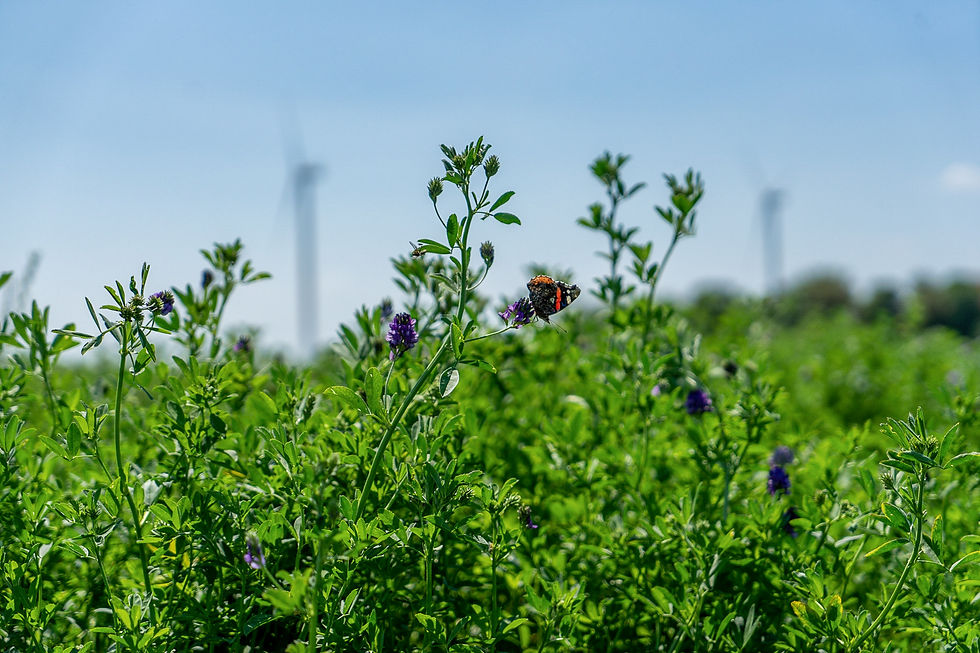Different Types of Fertilizers
- info782348
- Dec 10, 2024
- 3 min read
Updated: May 9, 2025
What are the different types of fertilizers?
Fertilizers are essential for plant growth and are often categorized based on their composition and origin. There are two main categories of fertilizers: organic and inorganic fertilizers.
Organic fertilzers
What does organic fertilizer mean? Organic fertilizers come from natural sources such as plant residues or animal materials. They have a gradual release of nutrients and improve soil structure. And what are the advantages and disadvantages of organic fertilizers? Examples of organic fertilizers include:
Animal Manure
Manure from cows, chickens, sheep, horses, etc. It contains nitrogen (N), phosphorus (P), and potassium (K) (often abbreviated as NPK) in different ratios. This is a very one-sided form of organic fertilizer, and it often has a distinct smell.
Compost
Composted plant material such as leaves, kitchen waste, and grass clippings. Rich in organic matter and microorganisms. Fun to make yourself – but it does require patience.
Green Manure
Plants with root nodules, such as lucerne, can be sown to improve the soil. While growing, lucerne enhances your soil. One disadvantage, however, is that you first need to sow lucerne before you can sow your desired crop, such as grass.
Plant-Based Fertilizers
At MAYA, we have developed the best plant-based organic fertilizer by capturing all the benefits of an organic fertilizer while eliminating the possible drawbacks. Our balanced plant-based fertilizer is spread over your lawn and borders, offering all the advantages of organic fertilizer with the convenience of a single product.
2. Inorganic (Chemical) Fertilizers
These types of fertilizers are usually synthetic and only nourish the plant, not the soil, which can eventually lead to soil depletion. Additionally, chemical fertilizers often have a shorter duration of effectiveness.
NPK-fertilizers:
Combinations of three minerals: nitrogen (N), phosphorus (P), and potassium (K), often in different ratios for various purposes.
Single-Element Fertilizers
Fertilizers that contain a single specific element. For single-element fertilizers, it is important to know which nutrient your plants are deficient in. Examples of single-element fertilizers include:
Nitrogen Fertilizers: Ammonium nitrate, urea.
Phosphorus Fertilizers: Superphosphate, triple superphosphate.
Potassium Fertilizers: Potassium chloride, potassium sulfate.
Microelements and Trace Elements
Fertilizers that contain specific trace elements such as iron, zinc, magnesium, boron, etc. For this type of fertilizer, it is also important to know which trace element your plant is deficient in before applying it. Overdosing can lead to risks and drawbacks.
Which is better, organic fertilizer or synthetic fertilizer?
A healthy lawn starts with the right nutrition. Many traditional (chemical) fertilizers are made entirely of synthetic substances that can deplete the soil in the long run. MAYA All-in-One Organic Lawn Fertilizer, on the other hand, works in harmony with nature. It nourishes the soil sustainably, allowing your grass to become stronger and develop a deeper root system. This ensures that your lawn not only becomes a beautiful dark green but is also better able to withstand drought, diseases, and pests.
Did you know that many organic fertilizers consist of animal products such as manure, blood, or bones? At MAYA, we leave these ingredients behind and derive our strength from plants, which is evident in all of our products. Our formulas are 100% free from animal ingredients, resulting in a sustainable product with a much more pleasant scent. MAYA stands for sustainability, quality, and respect for nature. We believe that we can make a difference, lawn by lawn, plant by plant. That’s why MAYA All-in-One Organic Lawn Fertilizer is the best fertilizer for your garden. Our answer to the question of whether organic or chemical fertilizer is better is clear: we always choose organic fertilizer.



Comments